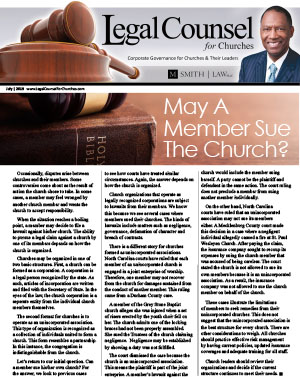Churches may not think of themselves in competition with each other. After all, churches serve a higher purpose than seeking market share at the expense of other religious organizations. However, the contest for new church members among churches may be unavoidable.
In some instances, businesses that compete with one another seek to keep their employees from leaving for a rival. One way organizations protect their turf is to have their employees sign a non-compete agreement.
A non-compete agreement is an understanding between the employer and employee that the employee will not work for a competitor for a period of time. This helps ensures a key staffer does not spill trade secrets or use his/her relationships to lure away customers.
A non-compete contract is enforceable in North Carolina so long as the terms do not over reach. The period of time must be reasonable. Courts want to make sure the employee is not unfairly prohibited from employment. The employee must have a skill or experience that is relevant to the organization’s competitiveness. The protected geography must be a reasonable area. A non- compete agreement may be unenforceable if the terms are unfair.
This leads us to the question of whether a church should use a non-compete agreement for its key employees. A church could consider the appeal of its senior pastor so essential to its competitiveness that his/her departure for a nearby church would be a threat. The same consideration could be applied to the music director, youth pastor or other officials. Any church employee whose parting for a cross-town church would negatively impact the church’s growth could be the kind of position worth protecting.
A non-compete agreement does not prevent an employee from leaving the church for membership elsewhere. The agreement does not preclude the employee from working in another field. Depending on how the language is constructed, a non-compete agreement limits certain activities that could be unfair to the current church employer.
The introduction of a non-compete agreement to church officials could be easily misunderstood. Church leaders interested in such an agreement should have a strategic discussion about what interests they seek to protect. As with all contracts, there are tradeoffs to make. The church should decide what incentives it is willing to offer a church employee to get them to forgo future employment opportunities.
For many, a non-compete agreement for churches take on doctrinal implications. On one hand, it might seem contrary to biblical principles to stand in the way of a person who wants to serve the Lord in another church.
On the other hand, church officials have a legal fiduciary duty to protect the interests of the church. Effective corporate governance suggests church leaders should weigh both concerns in making a decision whether to introduce non-compete agreements in the church.
Finally, a non-compete agreement is only as good as the church’s willingness to enforce its terms. If the church leaders are reluctant to litigate the protections of a non-compete agreement, the claims may simply be ineffective. A church could always waive its right to impose the agreement depending on the circumstances.
A non-compete contract can be an important protection against competition from past employees. The decision to proceed with such an agreement should include an open dialog with all parties.

